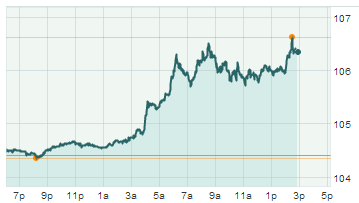Crude oil prices spiked $2.13 to $106.53 Thursday morning, putting the commodity at levels not seen since September 2013.
 Brent crude, meanwhile, rose as much as 2.2% to $112.34
Brent crude, meanwhile, rose as much as 2.2% to $112.34
Sending oil prices soaring was the Organization of the Petroleum Exporting Countries' (OPEC's) meeting in Vienna on Wednesday and the growing unrest in Iraq.
Chaos unfolded Wednesday in Iraq as militant forces moved closer toward Baghdad, seizing key cities. It's looking increasingly likely that Iraq is headed for civil war. The grave situation presents U.S. President Barack Obama with a new foreign policy dilemma.
If militants threaten Baghdad, the United States may have to use air power to support Iraqi security forces, James Jeffrey, a former U.S. ambassador to Iraq, told USA Today.
"This is the biggest regional crisis in the Persian Gulf since the fall of Hussein and will dramatically influence both politics and oil," said Dr. Kent Moors, Money Morning Global Energy Strategist. "The market continues to misunderstand the net impact here. Based on the range of conversations I have had with contacts in the region this morning, however, this is a full blown crisis likely to impact both policy and energy matters in a much wider area."
Indeed, a civil war is likely to have a ripple effect on neighboring nations and could choke off a big chunk of the world's oil supply.
If Bagdad loses control over the country's lucrative southern oil fields, which supply all of Iraq's exports (roughly 2.5 million barrels a day), the global oil supply will be severely pinched.
Iraq may evolve as a "significant wild card" in the oil markets, oil trading advisory company Ritterbusch & Associates commented following the critical situation in the Middle East nation. Oil prices are poised to climb if tensions continue to rise, the firm said.
Since the start of the year, West Texas Intermediate (WTI), the most actively traded oil contract, is up 8%. Brent futures are up roughly 4%. More gains are likely - at least in the short term.
"If the Iraq situation gets even the slightest bit worse, [prices] will break out to the upside," John Kilduff of Again Capital told CNBC. "If things keep going where they're going, there's another $5 to the upside."
Yet, Brent could quickly reach $125 if the situation worsens, Kilduff added. As geopolitical tensions rise, so do oil prices.
Contributing to the oil price rise was this news from OPEC...
OPEC Adds to Oil Price RiseThe precarious oil situation is further aggravated by OPEC's decision Wednesday to keep its full year 2014 production unchanged.
That left the influential group's output of 30.4 million barrels a day below oil forecast demand for the second half of the year. OPEC is comprised of 12 member nations that supply roughly 40% of the world's crude, or one in every three barrels of oil consumed globally.
In its monthly report on the oil market, OPEC forecast non-OPEC oil would rise by 1.2 million barrels a day in the next six months. That rate of growth is slower than in previous months, but the group feels confident it should be enough to meet growing demands when combined with OPEC's output and sufficient stockpiles.
Production from non-OPEC countries, driven particularly by a boom in U.S. shale oil, has risen by 4 million barrels per day over the last four years. That's more than the entire output of Canada, the world's fifth-largest producer. Coupled with Iraq's 22% output increase in oil since 2011, that's been more than enough to keep oil prices in a tight range.
"The relative steadiness of prices during 2014 to date is an indication that the market is adequately supplied," OPEC said in a statement.
The International Energy Agency (IEA), meanwhile, recommended last month a "significant rise in OPEC production," by about 800,000 barrels a day, in the second half of 2014 to meet its forecast OPEC crude demand. Additionally, IEA data showed that oil inventories in advanced nations sat at 2.62 billion barrels in April, the lowest level for that month since 2008.
With OPEC's formal limit remaining unchanged for the fifth consecutive meeting, Saudi Arabia is left with the task of increasing output to meet higher demand for the rest of the year. Libyan output remains constrained amid political turmoil in the country, and sanctions have curbed Iranian exports, according to Barclays Plc., Societe Generale SA, and Energy Aspects Ltd.
"Saudi Arabia likes the lack of price volatility and the outright price," Olivier Jakob, managing director of Switzerland consulting firm Petromatrix GmbH, told Bloomberg. "They want to keep it that way as long as possible."
Any disruption in supply and demand could be troubling for OPEC, global oil consumers, and oil prices. Trouble is brewing indeed...
This year's annual meeting of the American Society of Clinical Oncology (ASCO) turned us on to an important new trend - one that's shaping up as the next big profit opportunity in biotech. Here's how to profit from the "ASCO effect."
Related Articles:
Tags: best oil stocks, best oil stocks to buy, best oil stocks today, Crude Oil, Crude Oil Prices, crude oil prices today, energy investments, investing in oil, oil price forecast, oil price forecast 2014, oil price forecast today, oil price trends, oil price trends this week, oil price trends today, Oil Prices, oil prices 2014, oil prices and Iraq, oil prices today, oil prices trends 2014, oil stocks, oil stocks 2014, OPEC, price of oil, top oil stocks, top oil stocks todayThe post Crude Oil Prices Today Soar on Iraq and OPEC appeared first on Money Morning - Only the News You Can Profit From.

